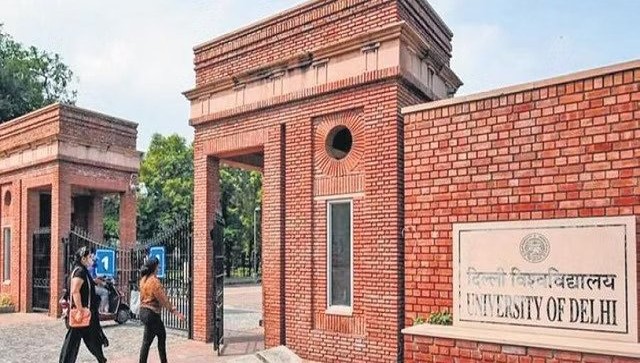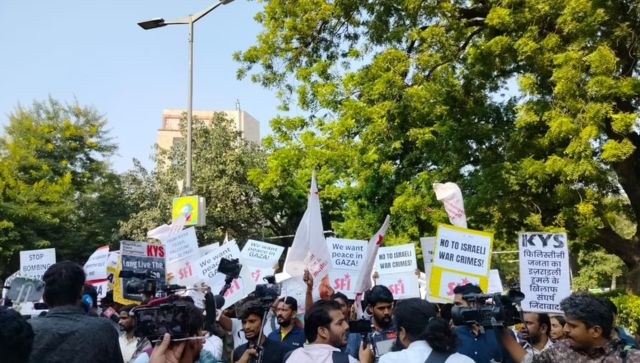Despite all the hype and hullabaloo generated for the dubious demand of absorption without interviews, the processes of permanent recruitment have already started in the University of Delhi. And the overwhelming majority of ad-hoc teachers who have been endlessly waiting with a flicker of hope for regular appointments to take place are extremely glad about it. They openly acknowledge and genuinely appreciate the sincere steps being taken for the permanent appointments. At the same time, the long-serving, hapless ad-hoc teachers harbour serious misgivings that regular recruitment may get delayed and, perhaps, deferred on one pretext or the other. Therefore, what is really needed is that these processes be expedited for the complete eradication of ad-hocism during the centenary year itself.
Delhi University has made tremendous contributions to the making of the nation during the last hundred years. And centenary celebrations can be the most opportune moments when DU administration under the leadership of Vice-chancellor Yogesh Singh provides stability and dignity to the life and career of more than 4,000 ad-hoc teachers who have been consistently contributing to the academic health and happiness of DU colleges and departments for over a decade.
Ad hoc appointments are temporary arrangements. They take place for a period of four months. According to EC Resolution 2007, such appointments cannot continue beyond four months. All posts which remain vacant after four months have to be necessarily made temporary positions. Only temporary teachers can be appointed by a duly constituted selection committee against those positions. There is no ambiguity on the nature of ad hoc and temporary teachers and ways of their appointment in either colleges or departments of Delhi University. Despite such absolute clarity, ad-hoc appointments have endlessly continued in both colleges and departments. It has been a very long journey for ad-hocs. And an extremely painful one, full of misery and misfortune, trial and tribulation, insult and humiliation of innumerable kinds. Why has ad-hocism continued for so long is an important question whose answer is not very difficult to find. Ad-hoc teachers did not really matter!
Each one of us knows for sure that DTF (Democratic Teachers’ Front) was for a pretty long time unsure of or rather uninterested in absorption and vehemently argued for permanent recruitment. Whereas AAD (Academics For Action And Development) was never in favour of open interviews since 2016 onwards. This clash of perspectives between the two political groups generated such a deadlock that it ruined the career of ad-hoc teachers and caused them and their families both immeasurable and unimaginable suffering. The DUTA leadership for this period failed primarily due to the internal clash of opinions and interests. The existence of ’endless’ ad-hocism in Delhi University is an acknowledgement of the unfortunate fact that the previous DUTA dispensation (DTF-AAD combo) failed to deliver and therefore the inhuman practice of ad-hocism continued unabated and uninterrupted.
Due to the continuation of endless ad-hocism, ad-hoc teachers prefer to be submissive and subservient because that is the safest route to save jobs and sustain livelihood. Who has the patience and perseverance to ponder over the larger question whether the state of submissiveness and subservience has really helped them or their institutions in any meaningful way. The truth is that such tendencies disable both the universities, which are supposed to be the space to generate innovative ideas and new knowledge systems, and also individual teachers, who could have otherwise meaningfully contributed to the growth of their colleges and departments they are working through their research, out-of-the-box thinking and teaching methods. Thus, the very foundations of a university get terribly weakened.
Widely acclaimed literary theorist and public intellectual, Terry Eagleton has been speaking a lot about the gradual disintegration of university systems. While speaking about the decline of universities, Eagleton remains preoccupied with the loss of critique from the university campuses which are dying for him due to the absence of dissent there. He has identified advanced capitalism responsible for the slow death of dissent which, he thinks, is a prerequisite for the university to function properly. Given the kind of orientation Western academia has developed over the centuries, it is not surprising that the nation-building enterprise is conspicuously missing from the mindset of Eagleton. This is to suggest that Western idea of a university as has been described by Eagleton, does not define an Indian way of looking at the university.
The idea of a formal university developed much before Christ in India in the seventh century BC. It triggered the formation of institutions like Takshila, Nalanda, Vikramshila and Vallabhi universities. They revolved around the integration of society and knowledge systems to ensure the growth of the nation in a healthy and eco-friendly way. It was exactly the existence of excellent knowledge systems that enabled teachers like Chanakya to successfully contribute to the making of a powerful, political empire based on the integration of skills, insights, information and wisdom of teachers with the need and requirement of the then society. Speaking within the context of Delhi University, prolonged ad-hocism has preempted almost all possibilities even for the conceptualisation, not to mention the production, of any such new systems which hold potential for the fulfilment of the collective wishes and aspirations of contemporary society in an enduring way.
So all of us must take an unequivocal stand on the appropriate ways in which ad-hocism will be entirely abolished from the university system. Ambiguity and ambivalence will no longer work. Given the immense suffering of ad-hoc teachers and consequent decline of the institution, none should continue to tread an uncertain path. The existing ad-hocism is a kind of infectious disease that has been creating numerous obstacles for the academic growth of this premier institution for a long spell of time. Till we root out this persistent disease, Delhi University will fail to enable its teachers and students to perform at par with global standards.
The writer is Assistant Professor in English, Rajdhani College, University of Delhi. Views expressed are personal.
Read all the Latest News , Trending News , Cricket News , Bollywood News , India News and Entertainment News here. Follow us on Facebook , Twitter and Instagram .


)




)
)
)
)
)
)
)
)